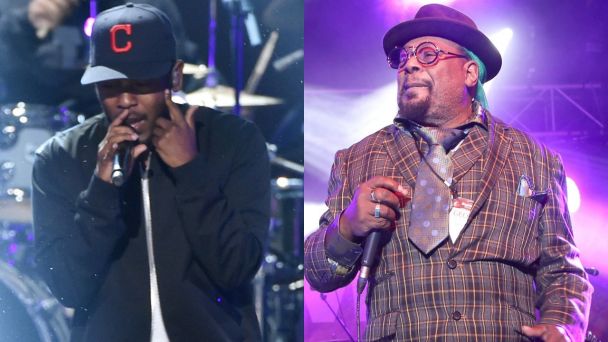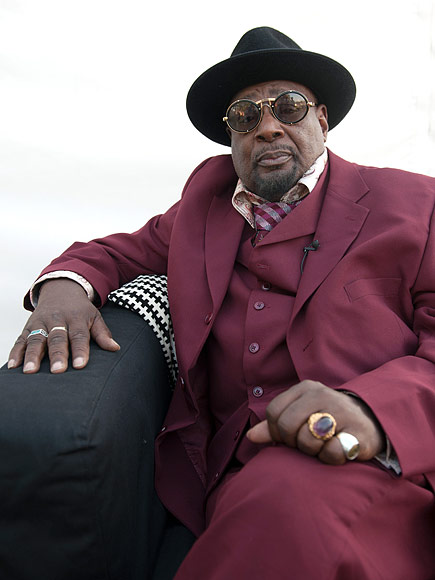
Kendrick Lamar is very likely going to win some Grammys this year.
That’s a good thing, because Lamar’s To Pimp a Butterfly deserves every piece of praise it earned last year. It’s a rich, challenging work that marries jazz, hip-hop and funk to Lamar’s dense, knotty and socially conscious rhymes. Any wins for Lamar and Butterfly are net gains for music.
At least one of those wins, however, would also be a win for George Clinton, founding member of Parliament, Funkadelic and one of the chief architects of funk music and by extension, hip-hop. Clinton is nominated as part of the small mob of names under the umbrella of the album.
George Clinton’s contributions to American music cannot be overstated. And for that matter, his contributions to hip-hop specifically cannot be overstated. But despite that, Clinton has never won a Grammy. Not one. Not in 40 years of making and influencing American music.
Clinton grew up in Plainfield, New Jersey, and formed his first group, The Parliaments, while working at a hair salon. Briefly a staff writer for Motown, Clinton found success in the ’70s under the umbrella of two groups, Parliament and Funkadelic, often referred to as “Parliament-Funkadelic” or even more simply as “P-Funk.”
Over the course of something like 40 hit singles – including three No. 1 hits and three platinum albums – P-Funk, under Clinton’s leadership, pioneered a kind of aspirational party music that posited musical and mental freedom as a vehicle for social change, clad in gleeful aphorisms like “Free Your Mind and Your Ass Will Follow” and “If You Don’t Like the Effects, Don’t Produce the Cause.” Clinton was “attracted to the philosophy of the Process Church of Final Judgment, an obscure religious cult that called for acceptance of the negative as a prerequisite to appreciating the positive,” name-dropping the Church in the liner notes to P-Funk albums. That even-handed message, of accepting the hardships of life while celebrating the joys, is a fundamental bedrock of “Black music” in America, and makes Clinton part of a lineage that stretches back as far as the blues and forward to artists like Lamar.
Clinton was one of the early pioneers of Afrofuturism, an aesthetic that combined ancient African and Egyptian iconography with concepts from science fiction. P-Funk, along with avant-garde jazz musician Sun Ra, started the Afrofuturist template that contemporary artists like Janelle Monáe and Shabazz Palaces are working within. Clinton “really developed this grand idea of envisioning African-Americans in space as a way to liberate one’s mind from the shackles of racism and poverty or any other societal constraints,” museum specialist Kevin Strait told NPR in 2014 when one of Parliament-Funkadelic’s onstage props, the Mothership, was inducted into the Smithsonian’s National Museum of African American History and Culture.

EDU HAWKINS / REDFERNS / GETTY
In many ways, Lamar’s album is a direct connection to the work Clinton was doing with P-Funk, but Clinton’s legacy is more obvious than that. In the early ’90s, West Coast rappers started using P-Funk samples in their beats, which is probably most prominently heard on Dr. Dre’s classic 1992 album The Chronic. The combination of what was starting to be called “gangsta rap” and P-Funk samples ended up being termed G-Funk; the deep bass, synth wobbles and choirs of female voices becoming one of hip-hop’s dominant palettes in the ’90s. Throughout the ’90s, Clinton proceeded to work with Tupac Shakur, Ice Cube and Outkast. At the popular site WhoSampled, which tracks the origins of hip-hop samples, Clinton’s name turns up 20 pages of results.
And he still doesn’t have a Grammy. He’s been nominated once before as a songwriter, in 1997, and once more alongside P-Funk members Walter Morrison and Garry Shider (as well as Kirk Franklin). Clinton, along with 15 other members of the P-Funk ensemble, was inducted into the Rock and Roll Hall of Fame in 1997, but he still doesn’t have a Grammy. According to the Recording Industry Association of America, he has nine gold albums and three platinum ones as part of the P-Funk empire – but, again, he still doesn’t have a Grammy.
Can we fix that this year? For the sake of the funk? And for America?
Source: People


 Top 20 Perú
Top 20 Perú  [Latino]: Diciembre de 1990
[Latino]: Diciembre de 1990 

